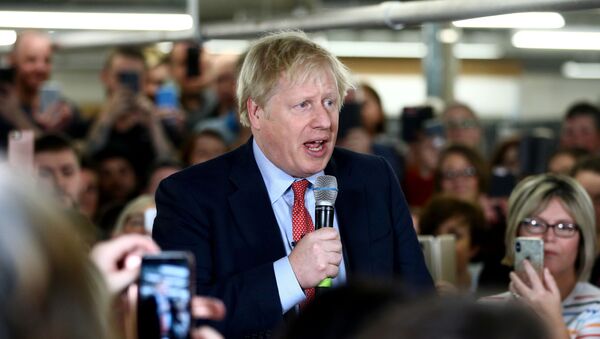Sputnik: Boris Johnson should now be able to get his Brexit deal through parliament, with a second reading before Christmas. What's your assessment of the vote?
Dr Ben Williams: Well, the vote was obviously a big victory for the Conservatives. And it was broadly in line with what the opinion polls had been saying. But I think it still took a lot of people by surprise. I think there was a growing belief that, you know, there might have been quite a close outcome, we might have another hung parliament. But it does give a clear victory to Boris Johnson, and that gives him a clear message that he can push through with Brexit now. That was his offer that he gave to the people. The people have voted for us in significant numbers. I think, you know, it's a fairly clear margin of victory for Boris Johnson.
Sputnik: Why do you think the Conservatives managed to seize seats from the Labour party in its traditional heartlands in the north and midlands?
Dr Ben Williams: These areas in the north and the Midlands, these kind of small towns which were fairly industrial in the past, they've been kind of neglected in recent years by successive governments. There's been a lack of investment. There's been various social and economic problems there. These were some of the areas with the highest Brexit vote in the 2016 referendum. And these areas were targeted by the Conservatives and they were traditional Labour areas. But these people in these areas appear to have taken the view that if we leave the European Union and Brexit is pursued, that their areas, their communities, will improve. So they appear to have voted for the conservatives on the basis by leaving the European Union, their lives and the opportunities of these areas will improve. And that's obviously an issue that not everyone agrees with and some people would question that and say, well, actually, the European Union is not the problem. But that appears to be why these areas voted for the conservatives. It links back to the 2016 Brexit vote.
Sputnik: Labour leader Jeremy Corbyn called it a "disappointing night" and said he would not lead the party in a future election, while Liberal Democrat leader Jo Swinson was ousted as an MP in East Dunbartonshire. What changes do you expect to start in British politics?
Follow up - What's the future for the Labour party? Who may be its next leader? Will Labour change its Brexit rhetoric?
Dr Ben Williams: Well, I think obviously both of the opposition parties, the main opposition party, the Labour Party, and the sort of small opposition party, the Liberal Democrats, they both had disappointing nights. Definitely. Obviously, Jeremy Corbyn was hoping to be prime minister and that's not going to happen. And he's announced basically that he is going to stand down as leader. I mean, he's of a certain age now. He's in his 70s. He's been leader a few years. He's long delays. And he will obviously now be standing down at some point. In terms of who is going to take over, I think that there's a belief that labour probably needs a different image. And there's a lot of talk about maybe giving the job to a woman. Labour have never had a woman leader, and they're are some very young and upcoming female MPs who have become quite well known in recent years. So that's an option. They certainly are gonna have to review their position on Brexit and decide a clearer position perhaps, because that certainly was a problem during the election. And of course, the liberal Democrats will, you know, their leader has now lost her seat, so she's no longer an MP. And on that premise, she effectively can no longer really be the leader. So, again, they're going to have a new leader as well who'll be an MP. So what you're going to have is the two main opposition parties in a state of turmoil for a period, while they sort themselves out and they get themselves new leaders.
Sputnik: The 2019 general election represents one of the more significant moments in postwar British politics - will there be deeper realignment? Given the last years of Brexit turmoil, can we speak about a new cultural divide?
Dr Ben Williams: I think we can. Yes, I think there is a new divide. People are talking very much last night about the realignments of modern politics. And in the past, it's been seen that labour were a more working-class policy, and used to do better in working-class industrialized areas and the conservatives were more of a more affluent middle-class party. What seems to have happened in recent elections and was reinforced last night, is that the Conservative Party have started to do better in the poorer more deprived communities, and that is linked to class changes, cultural views, in certain regions. Whereas Labour appears to increasingly have a changed level of support themselves. They tend to get most of their support from kind of middle-class professionals, academics, teachers, doctors, and an increasingly large number of students and younger voters. And Labour have a particular problem with older voters. Older voters don't seem to like Labour. They don't seem to like Jeremy Corbyn. So there are a number of divisions: class, age, education, cultural, where you live. And these have changed quite significantly in the last few years, going back to the 2016 referendum vote, and this has carried on in last night's general election.



